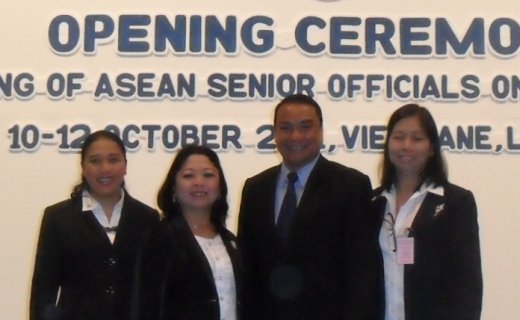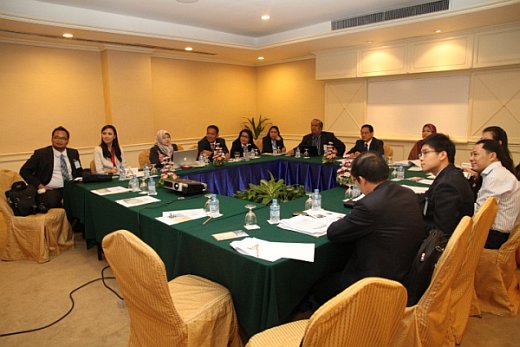The Philippines was among the 10 ASEAN member countries which participated in the 32nd ASOD meeting held in Lao Plaza Hotel, Vientiane, Lao People's Democratic Republic on October 10-12, 2011. Prof. Francis Grace H. Duka-Pante represented ATCPDE along with three other participants: Ms. Virginia P. Balmes, Dangerous Drugs Board's (DDB) Chief of the Policy Studies Research and Statistics Division; Ms. Teresita C. Pineda, DDB's Chief of Preventive Education, Training, and Information Division; and Dir. Wilkins M. Villanueva from the Philippine Drug Enforcement Agency (PDEA).

Guided by the united goal to attain a drug-free ASEAN by 2015, the meeting serves as a venue for the exchange of best practices in combating the drug menace in the ASEAN region. It also boosted regional cooperation especially on the issue of drug trafficking and other transnational crimes.
The Meeting was chaired by H.E. Mr.OunsengVixay, Head of Permanent Secretariat, National Commission for Drug Control and Supervision, Lao PDR. His Vice Chairman was Mr. Izhar Abu Talib from Malaysia.
The Meeting adopted the agenda which consisted of plenary sessions and five working group sessions namely, Preventive Education; Treatment, and Rehabilitation; Law Enforcement; Research and Alternative Development.
The first plenary session was the presentation of country reports of Heads of Delegations of the 10 ASEAN member countries. Ms. Balmes, being the head of the Philippine delegation, presented our country report. The reports of member countries highlighted the following:
- The ASEAN Member States continue to develop their national policies in line with the ASEAN Work Plan on Combating Illicit Drug Production, Trafficking and Use (2009-2015) and the ASEAN Vision of A Drug-Free ASEAN 2015.
- There is a significant progress on the Memorandum of Understanding on Drug Control which was signed between the Greater Mekong Sub-region (GMS) countries with UNODC in 1993.
- Strengthened bilateral, regional and cross border cooperation and joint actions contribute significantly to the identification, tracking and capture of drug syndicate activities.
- The role of academic institutions and mass media are considered pivotal in conveying drug-related messages to different range of audiences in the ASEAN Member States.
- There is increased preventive efforts through community-based approach and implemented policies in demand reduction, supply reduction and harm reduction in suppressing the spread of illicit drug use and production in the ASEAN Member States.
- The growing number of treatment and rehabilitation clinics, services and centers for drug users are evenly spread across the region.
- Legal frameworks in the ASEAN Member States are further improved to address the violation of acts related to illicit drug.
- The reduction of illicit drug in the region was noted yet the remaining large use of ketamine, heroine, methamphetaine needs to be further addressed.
- The Golden Triangle and Golden Crescent remains as the major route of drug smuggling through various methods such as packing in parcels or hiding drugs in human bodies.
- Inter-agency cooperation between concerned bodies is critical in tackling the cross-sectoral drug issues.
- The continuous cooperation with neighbouring countries and external entities has played an important role in the region's drug eradication attempts.

The succeeding plenary sessions focused on the review of implementation of decisions and recommendations undertaken during the 31st ASOD meeting along with the discussion on the effective cooperation with other dialogue partners such as China.
During the second day, Thailand presented its project proposal on establishing an ASEAN Airport Interdiction Task Force. It was followed by presentations from the United Nations Office on Drugs and Crime (UNODC) and Australia Federal Police (AFP).
For the working group sessions, the following assignments were followed: Ms. Pineda for Treatment and Rehabilitation, Ms. Balmes for Research, Dir. Villanueva for Law Enforcement and Prof. Duka-Pante for Preventive Education.
All the member countries were represented in the Preventive Education working group chaired by Indonesia. Various preventive efforts were being done by each country such as the anti-drug talent show in Brunei, drug awareness campaign during the Water Festival in Cambodia, organization of anti-drug abuse volunteers in Indonesia, creating drug-free villages in Lao PDR, high-risk group targeting in Malaysia, life skills education in Myanmar, organizing Barkada Kontra Droga (Peers Against Drugs) in the Philippines, use of digital and interactive media for drug prevention in Singapore, appointing anti-drug stars in Thailand and creating school-based drug programs in Vietnam. After the sharing, the group was able to come up with the following recommendations:
- Involve people in the anti-drug activities through preventive education in order to increase awareness and develop life skills;
- Encourage, support, and maintain anti-drug activities in and after school as an effective tool in informing students at all levels of the dangers of illicit drug use;
- Cooperate in the culturally sensitive campaign through media of the dangers of drug abuse via Corporate Social Responsibility programs and other modalities;
- Implement random drug testing for students (whenever applicable);
- Spread creative publication materials in various forms;
- Identify high-risk groups and conduct outreach programs; and
- Present during the 33rd ASOD meeting a training proposal in preventive drug education through the ASEAN Training Center for Preventive Drug Education based in Manila, Philippines.
The consideration and adoption of reports of the working group sessions was done during the last day. Dir. Villanueva presented the report of the Law Enforcement Group while Prof. Duka-Pante was assigned to present the recommendations of the Preventive Education group.
It was formally announced that the 33rd ASOD meeting will be in Malaysia. The last plenary session was the declaration and adoption of the Report of the 32nd meeting of ASOD followed by the Chairperson's Closing Remarks. (Prof. Grace P. Duka, 9nov2011)
